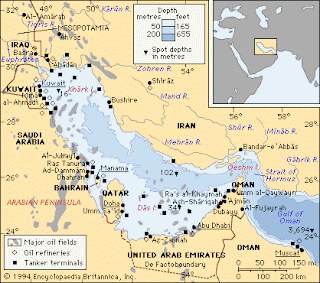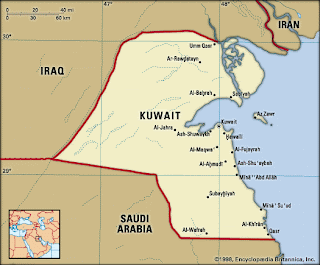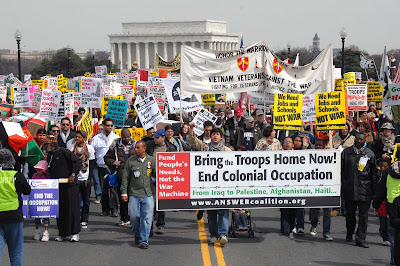 |
Brits Sunday Dec 18
Protest
West's attack on Iran |
Continuing carnage in Middle East
This week's protests, commentary on lies
Re-reporting, editing by Carolyn Bennett
U.S. in Iraq
“Fifty-seven (57) percent of all
Iraqis lived in slums,” Van Buren cites a 2009 UN report. “In the worst areas,
such as Maysan and Diyala, more than 80 percent lived in slums.”
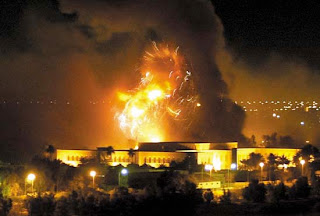 |
| IRAQ |
Before the
2003 U.S. invasion, “the average number of slum dwellers in Iraq was 20
percent.”
The foreign service officer wrote, “After years of seeking a military
solution, followed by years of building ineffective privies through our
embedded (with military) Provisional Reconstruction Teams (abbreviated ePRTs), we [the U.S.] simply declared victory and
started to pack up.
Van Buren said one of the sheiks commented that the U.S. “‘dug a deep
hole in 2003 and now are walking away leaving it empty.’ America sneezed and
Iraq caught the cold.”
Van Buren seems to excuse the inexcusable not only with his book title
“We meant well”; but he concludes, “Hubris stalked us; we suffered from
arrogance and we embraced ignorance.… [W]e lacked the courage to be
responsible. It was almost as if a new word were needed, disresponsible, a step
beyond irresponsible, meaning you should have been the one to take
responsibility but shucked it off.”
This week as the Nobel laureate president claimed, “mission
accomplished,” many reports and commentators assessed the continuing carnage.
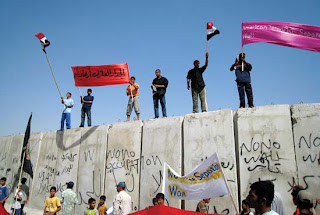 |
| Iraqis protest U.S. wall |
IRAQ
Women suffer most
The President of the Organization of Women’s Freedom in Iraq, Yanar
Mohammed, said Friday on the Democracy Now program, “Iraqi cities are now much
more destroyed than they were” before the U.S. invasion and years of foreign
occupation. “All the major buildings are still destroyed. If you drive in the
streets of the capital, your car cannot survive more than one month, because
all the streets are still broken. There was no reconstruction for the
buildings, for the cities.”
Because of the policies that were imposed in Iraq, Yanar Mohammed said,
“we have turned into a society of 99 percent poor and 1 percent rich.…
Destruction is everywhere. Poverty is for all the people except the 1 percent
who live inside the Green Zone.”
More than one million women have been widowed, some reports give higher
figures. “These widows try to survive on a salary of $150” but, because of
internal displacement, most widows “cannot get this salary.” Yet the 1 percent
of Iraqis living in the Green Zone — where there was a loss $40 billion from
the annual budget — “drowns in a sea of money.” After nine years, she said, “we
have the most corrupt government in the world and nobody is accountable for it.
“We are divided into a society of Shias, who are ruling, and Sunnis, who
want to get divided from the country of Iraq. We are now on the verge of the
division of country according to religions and ethnicities; it has already happened.
 The biggest losers are the women
The biggest losers are the women. “Poverty and discrimination against
women has become the norm.” Under the new constitution “are articles referring
to the Islamic Sharīah according to which “women are worth half a man legally
and one-quarter of a man socially in a marriage.”
Her organization, the Organization of Women’s Freedom in Iraq, she
says, meets women daily “who are vulnerable to being bought and sold in the
flesh market.”
Iraqis, she said, “are living in a huge military camp in which a
million Iraqi men are recruited into the army.” In addition, there are
“almost 50,000 militia members.”
Irrevocable Malevolence
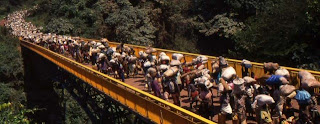 |
Refugees
UNHCR image |
In an article republished at Press TV, Chris Floyd (author of
Empire Burlesque) observes
much more forcefully that the U.S. president, in claiming an end to the war on
Iraq, uttered not a single word “about the
thousands and thousands and thousands
and thousands and thousands of Iraqis killed by this ‘fulfilled mission,’ this
‘extraordinary achievement,’ this ‘success.’
“These human beings — these sons and daughters, fathers, mothers,
kinfolk, lovers, friends — cannot be acknowledged; they cannot be perceived. It
must be as if they had never existed.
It must be as if they are not dead
now.
 |
| U.S. in Iraq |
“This divorce from reality is beyond description. It is the
all-pervasiveness of the disassociation that obscures its utter, its obvious
insanity. There is something intensely primitive and infantile in the
reductive, navel-gazing, self-blinding monomania of the U.S. psyche today.…
“The Iraq War has not ended. Not for the dead, not for their survivors,
not for the displaced, the maimed, the lost, the suffering, not for all of us
who live in the degraded, destabilized, impoverished world it has spawned, and
not for the future generations who will live with the ever-widening,
ever-deepening consequences of this irrevocable malevolence.”
Carnage over there, simultaneously over here
USA
 |
| USA |
Local U.S. municipalities bankrupt
Federal shutdown 3
School closings
Institute for Policy
Studies vice chair Saul Landau spoke in interview this week about U.S.
breakdown and Americans’ denial.
“There is a level of denial in the ruling group of Americans, the
political class and Congress and in the administration,” Landau said. “They are
denying climate change. They are denying the extent to which the economy has
tanked and really is close to going under in certain places, or indeed, has gone
under; and they continue to equate the Republic, which is in terrible shape. We
see empire: look at the defense budget that passed,
$700 billion not counting the money that goes for various wars, for nuclear
weapons, for the CIA, all of that adds up to almost a trillion dollars.”
 |
Military tactics
USA |
Money goes for a new fighter plane nobody wants and absolutely nobody
thinks is necessary — all the while U.S. schools are closing, people have no access
to health care, the cushion people used to be able to fall back on has diminished, for the really
poor it no longer exists and they are falling onto hard concrete.
“The system is collapsing,” he said, “and government officials and
those running for office are not facing it. … They want to cut, but not the
military — a military power greater than any in the world — because the
military stands for the empire.”
Landau says, “There is a disconnect, [and] we have now found a new
enemy, Iran. All of a sudden Iran is going to be the bane of the new cold war,
which is totally ridiculous.”
IRAN
 British activists call for end to hostility, provocation against Iran
British activists call for end to hostility, provocation against Iran
Today protesters dressed in white gather at the Bank of Ideas next to Finsbury Square, make banners, share ideas in preparation for tomorrow’s protests.
On Sunday, Britain’s peace activists will hold a peace march in protest
of ‘the British Government’s aggressive, illegal, and dangerous policy toward
Iran.’ The anti-war protesters will also protest against ‘the unjust war in
Afghanistan, which is at its bloodiest after ten years.’
“The protesters declared that the British government’s involvement in
wars around the world is ‘only in the interest of the 1 percent — a government
cabinet of millionaires and their friends in the oil and arms companies.’”
Announcing protest plans was Britain’s most prominent campaigner against unjust wars, the Stop the War Coalition.
 |
| Oil Rig - Iran |
From Tehran, the Director of the Iranian Armed Forces Center for
Strategic Studies, Rear Admiral Ali Shamkhani, has restated Tehran’s view of a
dangerous Western hypocrisy: that “the West and the U.S. are the founders and
sponsors of terrorism in the world and use terror tactics against their
opponents.”
The U.S. is using the imposition of sanctions on Iranian military
commanders as a means of exerting “psychological pressure and for propaganda
purposes.”
 |
Iran, Iraq
Afghanistan, Pakistan
Saudi Arabia |
The officer was referring to recent sanctions imposed on Chairman
of the Joint Chiefs of Staff of Iran’s Armed Forces Major General Hassan
Firouzabadi and Deputy Commander of the Ground Forces of Iran’s Islamic
Revolution Guards Corps (IRGC) Brigadier General Abdullah Araqi.
Press TV today is reporting Shamkhani saying, “‘Given that both
commander Firouzabadi and Araqi on the list of [individuals targeted by] U.S.
sanctions, such a measure (imposing a ban) is questionable.’” Criticizing
Western double standards regarding terrorism, he said, “‘Some Western
countries, which promote terrorism and sponsor assassination, accuse other
countries and their officials of terrorism.’
“As signatory to the nuclear Non-Proliferation Treaty (NPT) and a
member of the IAEA,” the news article reports, “Tehran has stood by its right
to develop and acquire nuclear technology meant for peaceful purposes.”
Continuing to terrorize Afghanistan and Pakistan
 |
| Afghan woman's body |
AFGHANISTAN/PAKISTAN
AFGHANISTAN
A pregnant Afghan woman died and four other women suffered wounds today
when U.S. forces raided a house in Afghanistan’s southeastern Paktia Province.
Two sons of the director of the counter-narcotics department of Paktia
Province, Hasibullah Ahmadzai, were reportedly detained during the raid.
The United States invaded Afghanistan in 2001 under the pretext of
eradicating Taliban militants. Since the invasion countless civilians have died
or been injured. The security situation remains fragile in Afghanistan despite
(or because of) the presence of nearly 150,000 U.S.-led foreign forces.
 |
| bombed minibus Afghanistan |
The slaughter of civilians has caused deep anger among Afghans and
prompted violent demonstrations throughout the country.
Yesterday in Kabul, a police station came under attack. A bomber blew
himself up at a police station in Kotai Sangi area. In a second incident, a
group of armed militants broke into police headquarters and detonated an
explosive.
On Thursday, at least two Afghan soldiers died and two others were
wounded when their vehicle hit a roadside bomb in Afghanistan’s northwestern
province of Badghis.
Also on Thursday at least four civilians died and eight others were
injured when a roadside bomb exploded in Afghanistan’s western province of
Farah. A minibus came upon the explosive device on a road in the Malai area of
Pur Chaman district in the province.
On Wednesday a roadside bomb had killed an anti-Taliban district
governor and two of his bodyguards in the southern Helmand Province.
Roadside bombs and improvised explosive devices are reportedly the most
lethal weapons Taliban militants have used against foreign troops, Afghan
forces, and civilians.
PAKISTAN
Demanding end to assassination drones, breach of sovereignty
On Thursday at the Pakistan Embassy in Washington, Pakistani officials reportedly made a presentation about the November 26 NATO cross border attacks that left Pakistani officers dead.
Senior Pakistani officials showed relevant material that they said could prove
what happened in NATO’s deadly assault on a pair of Pakistan’s army border
outposts at the Afghan border was no mistake.
“The evidence presented to international journalists also showed that
the shooting by helicopter gunships continued for an hour after NATO forces
told Pakistani officials at the posts that it would stop.”
Acting Pakistani envoy Iffat Imran Gardezi said, “‘We want to offer our
view of the incident as we see it.’”
Pakistani Prime Minister Yousuf Raza Gilani said Islamabad will
continue blocking of NATO convoys.
Meeting on Friday with the U.S. Ambassador to Pakistan Cameron Munter,
Pakistani Prime Minister Yusuf Raza Gilani said that the United States had to
guarantee that it would commit no more breaches of the country’s borders in the
future.
The United States, Gilani said, “must respect Pakistan’s red lines as
well as the Central Asian nation’s national sovereignty and territorial
integrity.”
Pakistan has closed the border crossings the Western military
alliance uses to send fuel and other supplies to the U.S.-led forces in
landlocked Afghanistan. Around 40 percent of the non-lethal supplies travel
across the Pakistani soil.
On Thursday in the eastern city of Lahore, hundreds of Pakistanis took
to the streets to voice their anger over the NATO cross-border airstrikes that
killed two dozen Pakistani soldiers in that late November attack. NATO helicopters and fighter jets on November 26 attacked two military
border posts in northwest Pakistan and killed 24 Pakistani troops.
Protesters continued their chants of anti-U.S. slogans. They burned NATO in
effigy and lit candles to mourn for Pakistani soldiers who died in the attack.
DRONES
Britain interrogated on collusion
In the face of many reports indicating that UK intelligence has
assisted U.S. CIA with providing
locations of alleged militants later targeted by U.S. drones, law firm
Leigh Day and Co, acting on behalf of Noor Khan, have called on British Foreign
Secretary William Hague “to clarify the role of the British intelligence in CIA drone attacks.… Reveal how British intelligence has assisted America’s ‘targeted killing’ campaign in Pakistan.”
Together with the killing of hundreds of Pakistani civilians, among the
dead was Noor Kahn’s father. He was a victim of U.S. drone strikes in northwest
Pakistan.
“‘Unless it is categorically
denied that the UK continues to pass such information to the U.S. government
forces,’” said the head of the law
firm’s human rights department, “‘we require a clear policy statement of the
arrangements which are in place and circumstances in which the UK considers it
to be lawful to do so.’”
AFRICA
Libya- War crime?
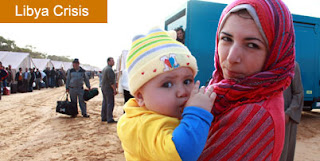
The chief prosecutor of the International Criminal Court (ICC), Luis
Moreno-Ocampo, says there are serious suspicions that the death of Libyan
leader Muammar Qaddafi may be a war crime.
On October 20, eight months into the revolution that put an end to his
42-year-long rule, “Revolutionary fighters found Muammar Qaddafi hiding inside
a concrete sewage pipe in his hometown of Sirte.” Videos taken at the time show
the Libyan leader injured but alive and surrounded by a frenzied crowd. “He is
hustled through revolutionaries and beaten to the ground on several occasions.”
Qaddafi “then disappears in the crush and the crackle of gunfire.”
On October 25, Qaddafi and his slain son, Mu’tassim, are buried in a
secret location in the North African country.
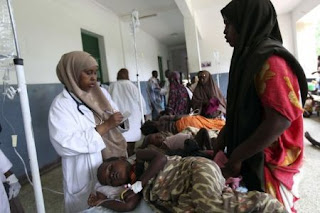 |
Somalia hospital
Displaced people |
SOMALIA
Hardest hit in worst drought in the Horn of Africa in six decades.
This week in a 12-hour period, 50 children died in refugee camps
between Mogadishu and Afgoye. Cholera and malaria had broken out in the camps
of this famine-stricken country where there are insufficient medicines to help
those stricken with diseases. Close to 580 children went to hospitals.
Drought and famine have affected millions of people across Somalia,
Kenya, and Ethiopia. United Nations reports say a quarter of Somalia’s 9.9
million people are either internally displaced or living outside the country as
refugees.
Reports have shown that the Somali people have also come under attack by U. S. drones.
 |
| Cairo October |
EGYPT
Protests against army persist
Yesterday in Cairo two people died in Egyptian army rulers’ crack down
on protesters who are demanding an end to military rule in the country. Close
to a hundred people were injured.
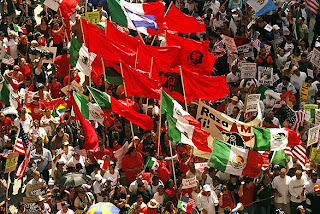 |
| Los Angeles immigrants |
Activists told reporters that the clashes originally erupted on
Thursday evening after the police beat up a young man participating in a sit-in
protest outside the cabinet building.
 |
| YEMEN |
Egyptian protesters accuse the military junta of carrying on with
practices used by the former ruler, Hosni Mubarak. They are calling for his
successor, the Supreme Council of Armed Forces, to hand over power to a
civilian government.
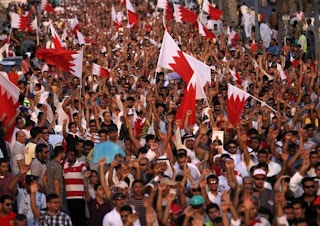 |
| BAHRAIN |
Protests and military-style crackdowns also continued this week in Yemen, Bahrain, Syria, and in the United States.
 Persistent casualties of persistent war
Persistent casualties of persistent war
“Despite the conventions of modern warfare that forbid armies to target
civilians,” Ann Jones writes of the unhealthiness of war, it is
civilians who die in far greater numbers than soldiers.
“The more high-tech the army, the more sophisticated its weaponry, the
safer the soldiers; but that shield does not extend to civilians.
“In fact, in many conflicts today, ruthless leaders use an effective
strategy to destroy the civil society and culture of the enemy: a deliberate
but unacknowledged war against women.”
Sources and notes
IRAQ
We meant well: How I helped lose
the battle for the hearts and minds of the Iraqi people
Peter Van Buren. New York: Metropolitan Books Henry Holt and Company,
2011, pp. 253-254
“Iraqi Women’s Activist Rebuffs U.S. Claims of a Freer Iraq: ‘This is
not a Democratic Country,’” December 16, 2011,
http://www.democracynow.org/2011/12/16/iraqi_womens_activist_rebuffs_us_claims
Sharīah (also spelled sharia): the fundamental religious concept of
Islam, namely its law, systematized during the 2nd and 3rd centuries of the
Muslim era (8th–9th centuries AD).
“The Costs of War: Tens of Thousands Dead, Billions Spent, and a
Country Torn Apart,” December 16, 2011,
http://www.democracynow.org/2011/12/16/iraqi_womens_activist_rebuffs_us_claims
“War without end, amen: the reality of America’s aggression against
Iraq” (Chris Floyd, Empire Burlesque, December 17, 2011, http://www.presstv.ir/usdetail/216254.html
Further excerpt from Chris Floyd’s article
“In March 2003, the United States of America launched an entirely
unprovoked act of military aggression against a nation that had not attacked it
and posed no threat to it.
“This act led directly to the deaths of hundreds of thousands of
innocent people. It drove millions more from their homes, and plunged the
entire conquered nation into suffering, fear, hatred and deprivation.
“This is the reality of what actually happened in Iraq: aggression,
slaughter, atrocity, ruin. It is the only reality; there is no other. Moreover,
it was done deliberately, knowingly, willingly.
“Indeed, the bipartisan American power structure spent more than $1
trillion to make it happen. It is a record of unspeakable savagery, an
abomination, an outpouring of the most profound and filthy moral evil.
“Line up the bodies of the
children, the thousands of children — the infants, the toddlers, the school
kids — whose bodies were torn to pieces, burned alive or riddled with bullets
during the American invasion and occupation of Iraq. Line them up in the desert
sand, walk past them, mile after mile, all those twisted corpses, those scraps
of torn flesh and seeping viscera, those blank faces, those staring eyes fixed
forever on nothingness.
“This is the reality of what happened in Iraq; there is no other
reality. …You cannot make it otherwise. It has already happened. It always will
have happened. You can of course ignore it. This is the path chosen by the
overwhelming majority of Americans, and by the entirety of the bipartisan
elite. This involves a pathological degree of disassociation from reality.”
CHRIS FLOYD
Chris Floyd is an U.S. journalist whose work has appeared in print and
online in sources including The Nation, Counterpunch, Columbia Journalism
Review, the Christian Science Monitor, Il Manifesto, the Moscow Times and many
others. He is the author of Empire
Burlesque: High Crimes and Low Comedy in the Bush Imperium; and co-founder
and editor of the ‘Empire Burlesque’ political blog.
“War Without End, Amen: The Reality of America’s Aggression Against
Iraq” (Chris Floyd), Friday, December 16, 2011, http://www.chris-floyd.com/component/content/frontpage
“Divide widening between US rich, poor — The ‘incredibly unequal
top-down distribution of wealth’ in the U.S. has formed an elite group who
controls most aspects of the country’s affluence, according to analysts,”
December 16, 2011, http://www.presstv.ir/detail/216090.html
Saul Landau is an internationally known scholar, author, commentator,
and filmmaker on foreign and domestic policy issues. In 2008, the Chilean
government presented him with the Bernardo O’Higgins Award for his human rights
work. Landau has written fourteen books. He is Professor Emeritus at California
State University, Pomona and a senior Fellow at and Vice Chair of the Institute
for Policy Studies, http://saullandau.com/
IRAN
“UK protesters urge policy shift on Iran,” December 17, 2011,
http://www.presstv.ir/detail/216215.html
“‘U.S. uses sanctions as psywar tactic,’” December 17, 2011,
http://www.presstv.ir/detail/216244.html
AFGHANISTAN
“U.S. forces kill pregnant Afghan woman, December 17, 2011,
http://www.presstv.ir/detail/216210.html
http://www.presstv.ir/detail/216170.html
“Police station bombed in Afghan capital,” December 16, 2011, http://www.presstv.ir/detail/216066.html
“Bomb blast kills 2 Afghan soldiers,” December 15, 2011,
http://www.presstv.ir/detail/215858.html
“Roadside bomb kills 4 Afghan civilians,” December 15, 2011, http://www.presstv.ir/detail/215850.html
PAKISTAN
“Pakistan: NATO raids were deliberate” (citing Christian Science
Monitor reporting), December 16, 2011, http://www.presstv.ir/detail/215958.html
“Pakistan: U.S. must heed our red lines,” December 16, 2011,
http://www.presstv.ir/detail/216099.html
“Pakistanis protest deadly NATO attacks,” December 16, 2011,
http://www.presstv.ir/detail/215973.html
http://www.presstv.ir/section/351020401.html
DRONES
“Britain questioned over CIA drone strike” [“‘CIA drone strikes are
killing hundreds - if not thousands - of civilians and destabilizing
Pakistan’”], December 17, 2011, http://www.presstv.ir/detail/216274.html
AFRICA
LIBYA
“Qaddafi killing could be war crime: ICC,” December 16, 2011,
http://www.presstv.ir/detail/215990.html
SOMALIA
“Diseases kill 50 more Somali children,” December 15, 2011,
http://www.presstv.ir/detail/215815.html
EGYPT
“Two protesters killed in Cairo violence,” December 16, 2011,
http://www.presstv.ir/detail/216089.html
Jones, Ann
War is not over when it’s over:
women speak out from the ruins of war, Ann Jones, New York: Metropolitan
books, 2010, p. 7
______________________________
Bennett's books are available in New York State independent bookstores: Lift Bridge Bookshop: www.liftbridgebooks.com [Brockport, NY]; Sundance Books: http://www.sundancebooks.com/main.html [Geneseo, NY]; Mood Makers Books: www.moodmakersbooks.com [City of Rochester, NY]; Dog Ears Bookstore and Literary Arts Center: www.enlightenthedog.org/ [Buffalo, NY]; Burlingham Books – ‘Your Local Chapter’: http://burlinghambooks.com/ [Perry, NY 14530]; The Bookworm: http://www.eabookworm.com/ [East Aurora, NY] • See also: World Pulse: Global Issues through the eyes of Women: http://www.worldpulse.com/ http://www.worldpulse.com/pulsewire
http://www.facebook.com/#!/bennetts2ndstudy
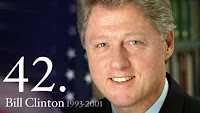
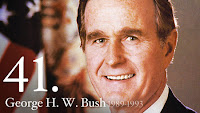 “This story really began in the
early 1990s,” says the Foreign Service Officer who had been posted in Iraq with an embedded-with-military U.S. State Department Provisional Reconstruction Team
(ePRT) before writing We Meant Well. From that time forward, Van Buren writes, “Iraq
had been continually under siege by the United States. It was a
seamless epic as the war of 1990-91 continued through the non-fly zones and the
sanctions of the nineties — to be capped off by the 2003 invasion and the
ensuing years of occupation.
“This story really began in the
early 1990s,” says the Foreign Service Officer who had been posted in Iraq with an embedded-with-military U.S. State Department Provisional Reconstruction Team
(ePRT) before writing We Meant Well. From that time forward, Van Buren writes, “Iraq
had been continually under siege by the United States. It was a
seamless epic as the war of 1990-91 continued through the non-fly zones and the
sanctions of the nineties — to be capped off by the 2003 invasion and the
ensuing years of occupation.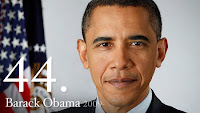 “During Desert Storm, we [U.S.
and allies] destroyed large portions of Iraq’s infrastructure. We had gone out
of our way to make a mess, using clever tools such as cruise missiles that spat
metallic fibers to short out entire electrical systems we would have to
reconstruct.
“During Desert Storm, we [U.S.
and allies] destroyed large portions of Iraq’s infrastructure. We had gone out
of our way to make a mess, using clever tools such as cruise missiles that spat
metallic fibers to short out entire electrical systems we would have to
reconstruct.


